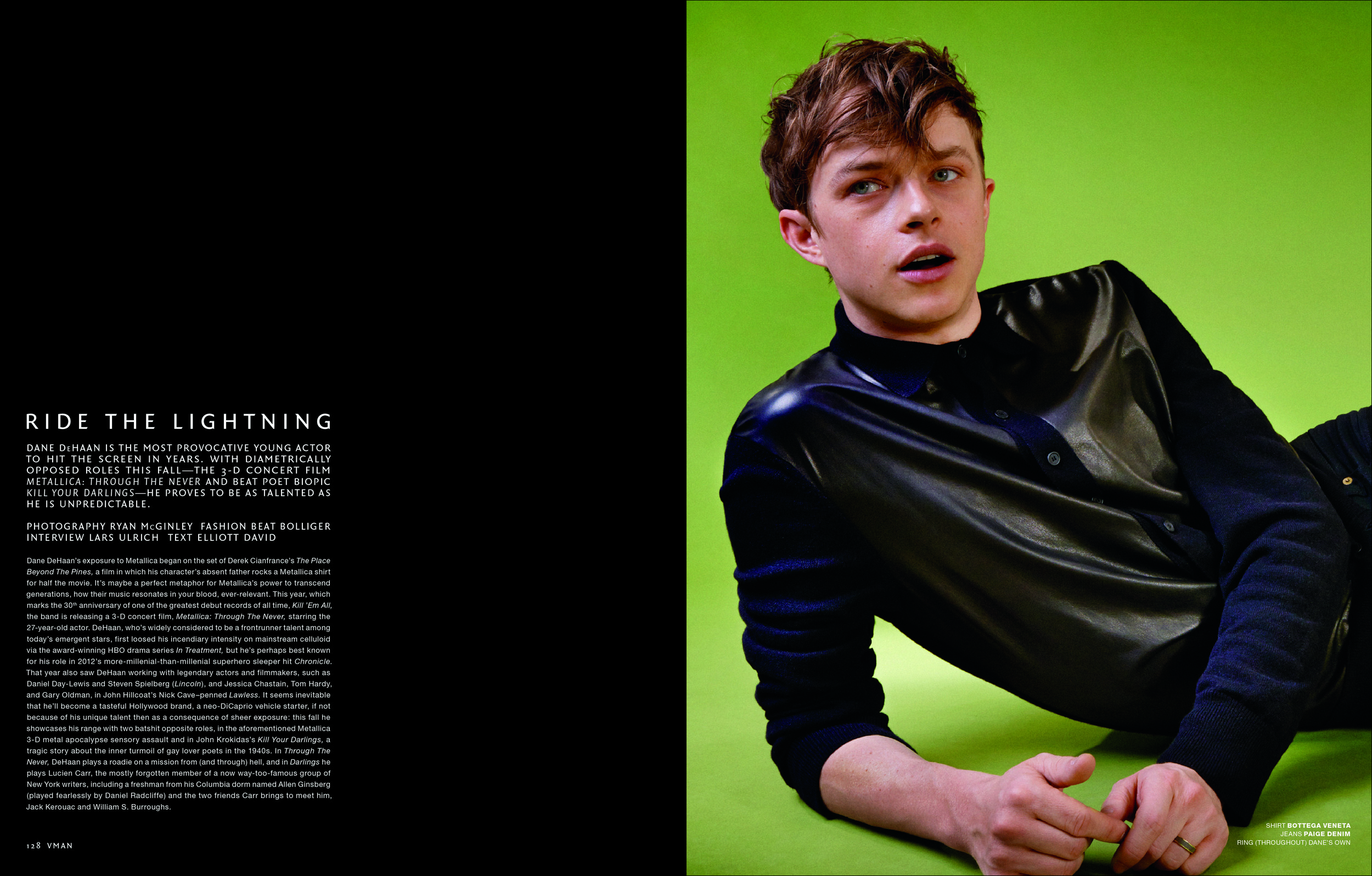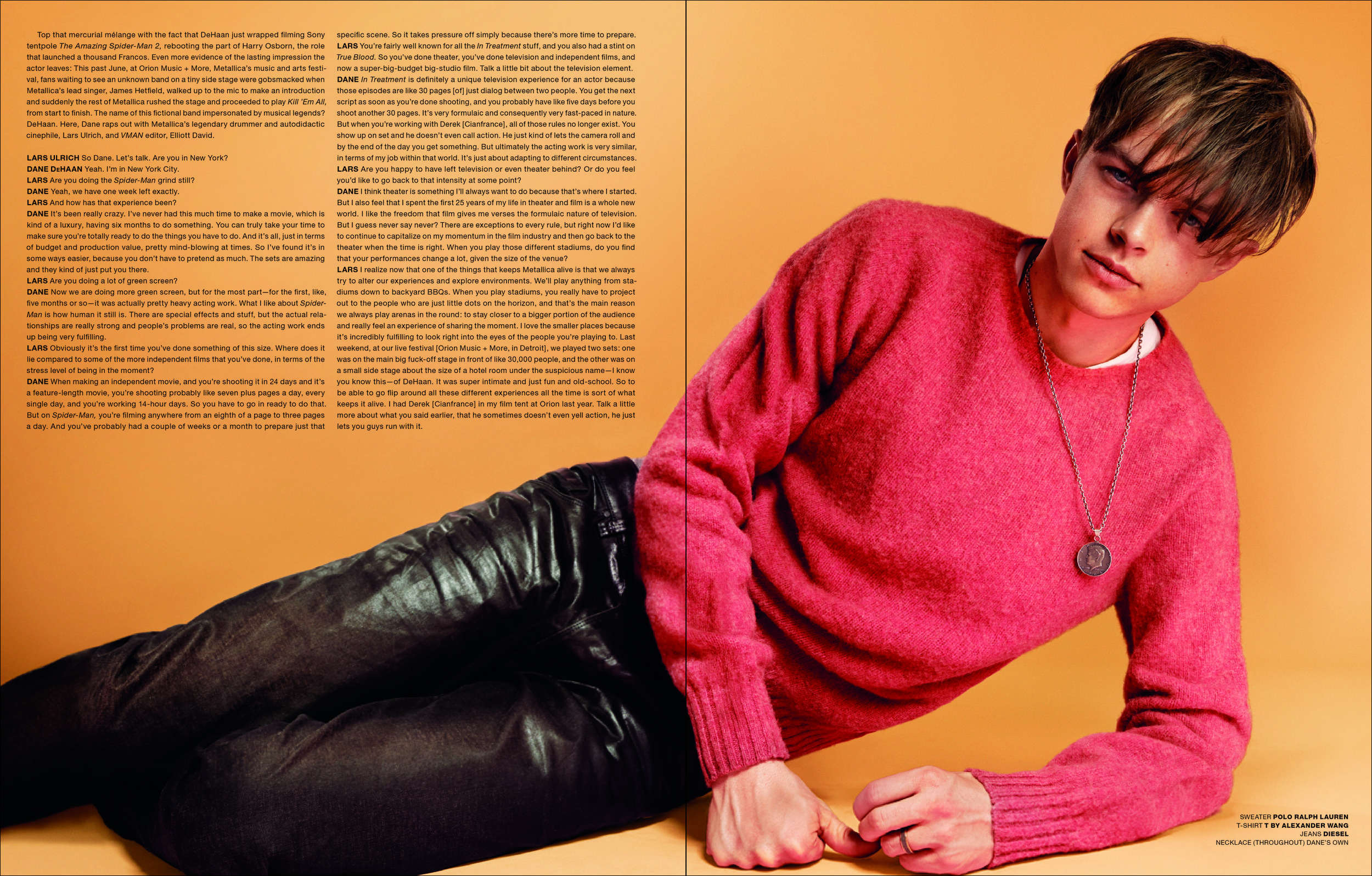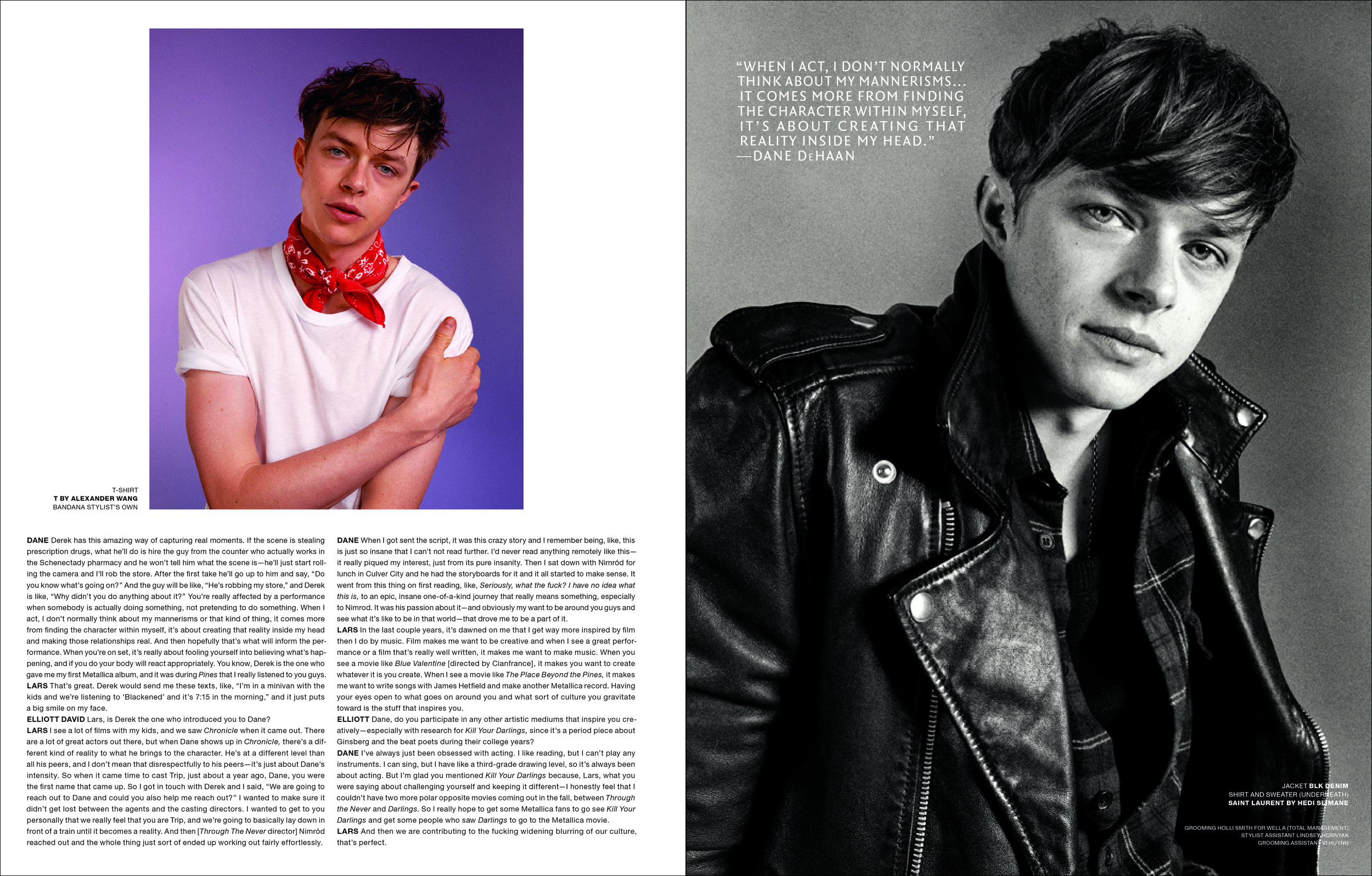Elliott W. David
INTERVIEWS AND SUCH
Index
Dane DeHaan photographed by Ryan McGinley, interviewed by Metallica's Lars Ulrich.
Approached Lars, with whom I'd worked before, about doing the interview, provided them with talking points, moderated the conversation, wrote text.




PHOTOGRAPHY RYAN MCGINLEY
TEXT ELLIOTT DAVID INTERVIEW LARS ULRICH
DANE DeHAAN IS THE MOST PROVOCATIVE YOUNG ACTOR TO HIT THE SCREEN IN YEARS. WITH DIAMETRICALLY OPPOSED ROLES THIS FALL—THE 3-D CONCERT FILM METALLICA: THROUGH THE NEVER AND THE BEAT POET BIOPIC KILL YOUR DARLINGS—HE PROVES TO BE AS TALENTED AS HE IS UNPREDICTABLE.
Dane DeHaan’s exposure to Metallica began on the set of Derek Cianfrance’s The Place Beyond The Pines, a film in which his character’s absent father rocks a Metallica shirt for half the movie. It’s maybe a perfect metaphor for Metallica’s power to transcend generations, how their music resonates in your blood, ever-relevant. This year, which marks the 30th anniversary of one of the greatest debut records of all time, Kill ’Em All, the band is releasing a 3-D concert film, Metallica: Through The Never, starring the 27-year-old actor. DeHaan, who’s widely considered to be a frontrunner talent among today’s emergent stars, first loosed his incendiary intensity on mainstream celluloid via the award-winning HBO drama series In Treatment, but he’s perhaps best known for his role in 2012’s more-millenial-than-millenial superhero sleeper hitChronicle. That year also saw DeHaan working with legendary actors and filmmakers, such as Daniel Day-Lewis and Steven Spielberg (Lincoln), and Jessica Chastain, Tom Hardy, and Gary Oldman, in John Hillcoat’s Nick Cave–pennedLawless. It seems inevitable that he’ll become a tasteful Hollywood brand, a neo-DiCaprio vehicle starter, if not because of his unique talent then as a consequence of sheer exposure: this fall he showcases his range with two batshit opposite roles, in the aforementioned Metallica 3-D metal apocalypse sensory assault and in John Krokidas’s Kill Your Darlings, a tragic story about the inner turmoil of gay lover poets in the 1940s. In Through The Never, DeHaan plays a roadie on a mission from (and through) hell, and in Darlings he plays Lucien Carr, the mostly forgotten member of a now way-too-famous group of New York writers, including a freshman from his Columbia dorm named Allen Ginsberg (played fearlessly by Daniel Radcliffe) and the two friends Carr brings to meet him, Jack Kerouac and William S. Burroughs.
Top that mercurial mélange with the fact that DeHaan just wrapped filming Sony tentpole The Amazing Spider-Man 2, rebooting the part of Harry Osborn, the role that launched a thousand Francos. Even more evidence of the lasting impression the actor leaves: This past June, at Orion Music + More, Metallica’s music and arts festival, fans waiting to see an unknown band on a tiny side stage were gobsmacked when Metallica’s lead singer, James Hetfield, walked up to the mic to make an introduction and suddenly the rest of Metallica rushed the stage and proceeded to play Kill ’Em All, from start to finish. The name of this fictional band impersonated by musical legends? DeHaan. Here, Dane raps out with Metallica’s legendary drummer and autodidactic cinephile, Lars Ulrich, and VMAN editor, Elliott David.
LARS ULRICH So Dane. Let’s talk. Are you in New York?
DANE DEHAAN Yeah. I’m in New York City.
LARS Are you doing the Spider-Man grind still?
DANE Yeah, we have one week left exactly.
LARS And how has that experience been?
DANE It’s been really crazy. I’ve never had this much time to make a movie, which is kind of a luxury, having six months to do something. You can truly take your time to make sure you’re totally ready to do the things you have to do. And it’s all, just in terms of budget and production value, pretty mind-blowing at times. So I’ve found it’s in some ways easier, because you don’t have to pretend as much. The sets are amazing and they kind of just put you there.
LARS Are you doing a lot of green screen?
DANE Now we are doing more green screen, but for the most part—for the first, like, five months or so—it was actually pretty heavy acting work. What I like about Spider-Man is how human it still is. There are special effects and stuff, but the actual relationships are really strong and people’s problems are real, so the acting work ends up being very fulfilling.
LARS Obviously it’s the first time you’ve done something of this size. Where does it lie compared to some of the more independent films that you’ve done, in terms of the stress level of being in the moment?
DANE When making an independent movie, and you’re shooting it in 24 days and it’s a feature-length movie, you’re shooting probably like seven plus pages a day, every single day, and you’re working 14-hour days. So you have to go in ready to do that. But on Spider-Man, you’re filming anywhere from an eighth of a page to three pages a day. And you’ve probably had a couple of weeks or a month to prepare just that specific scene. So it takes pressure off simply because there’s more time to prepare.
LARS You’re fairly well known for all the In Treatment stuff, and you also had a stint on True Blood. So you’ve done theater, you’ve done television and independent films, and now a super-big-budget big-studio film. Talk a little bit about the television element.
DANE In Treatment is definitely a unique television experience for an actor because those episodes are like 30 pages [of] just dialog between two people. You get the next script as soon as you’re done shooting, and you probably have like five days before you shoot another 30 pages. It’s very formulaic and consequently very fast-paced in nature. But when you’re working with Derek [Cianfrance], all of those rules no longer exist. You show up on set and he doesn’t even call action. He just kind of lets the camera roll and by the end of the day you get something. But ultimately the acting work is very similar, in terms of my job within that world. It’s just about adapting to different circumstances.
LARS Are you happy to have left television or even theater behind? Or do you feel you’d like to go back to that intensity at some point?
DANE I think theater is something I’ll always want to do because that’s where I started. But I also feel that I spent the first 25 years of my life in theater and film is a whole new world. I like the freedom that film gives me verses the formulaic nature of television. But I guess never say never? There are exceptions to every rule, but right now I’d like to continue to capitalize on my momentum in the film industry and then go back to the theater when the time is right. When you play those different stadiums, do you find that your performances change a lot, given the size of the venue?
LARS I realize now that one of the things that keeps Metallica alive is that we always try to alter our experiences and explore environments. We’ll play anything from stadiums down to backyard BBQs. When you play stadiums, you really have to project out to the people who are just little dots on the horizon, and that’s the main reason we always play arenas in the round: to stay closer to a bigger portion of the audience and really feel an experience of sharing the moment. I love the smaller places because it’s incredibly fulfilling to look right into the eyes of the people you’re playing to. Last weekend, at our live festival [Orion Music + More, in Detroit], we played two sets: one was on the main big fuck-off stage in front of like 30,000 people, and the other was on a small side stage about the size of a hotel room under the suspicious name—I know you know this—of DeHaan. It was super intimate and just fun and old-school. So to be able to go flip around all these different experiences all the time is sort of what keeps it alive. I had Derek [Cianfrance] in my film tent at Orion last year. Talk a little more about what you said earlier, that he sometimes doesn’t even yell action, he just lets you guys run with it.
DANE Derek has this amazing way of capturing real moments. If the scene is stealing prescription drugs, what he’ll do is hire the guy from the counter who actually works in the Schenectady pharmacy and he won’t tell him what the scene is—he’ll just start rolling the camera and I’ll rob the store. After the first take he’ll go up to him and say, “Do you know what’s going on?” And the guy will be like, “He’s robbing my store,” and Derek is like, “Why didn’t you do anything about it?” You’re really affected by a performance when somebody is actually doing something, not pretending to do something. When I act, I don’t normally think about my mannerisms or that kind of thing, it comes more from finding the character within myself, it’s about creating that reality inside my head and making those relationships real. And then hopefully that’s what will inform the performance. When you’re on set, it’s really about fooling yourself into believing what’s happening, and if you do your body will react appropriately. You know, Derek is the one who gave me my first Metallica album, and it was duringPines that I really listened to you guys.
LARS That’s great. Derek would send me these texts, like, “I’m in a minivan with the kids and we’re listening to ‘Blackened’ and it’s 7:15 in the morning,” and it just puts a big smile on my face.
ELLIOTT DAVID Lars, is Derek the one who introduced you to Dane?
LARS I see a lot of films with my kids, and we saw Chronicle when it came out. There are a lot of great actors out there, but when Dane shows up in Chronicle, there’s a different kind of reality to what he brings to the character. He’s at a different level than all his peers, and I don’t mean that disrespectfully to his peers—it’s just about Dane’s intensity. So when it came time to cast Trip, just about a year ago, Dane, you were the first name that came up. So I got in touch with Derek and I said, “We are going to reach out to Dane and could you also help me reach out?” I wanted to make sure it didn’t get lost between the agents and the casting directors. I wanted to get to you personally that we really feel that you are Trip, and we’re going to basically lay down in front of a train until it becomes a reality. And then [Through The Never director] Nimród reached out and the whole thing just sort of ended up working out fairly effortlessly.
DANE When I got sent the script, it was this crazy story and I remember being, like, this is just so insane that I can’t not read further. I’d never read anything remotely like this—it really piqued my interest, just from its pure insanity. Then I sat down with Nimród for lunch in Culver City and he had the storyboards for it and it all started to make sense. It went from this thing on first reading, like, Seriously, what the fuck? I have no idea what this is, to an epic, insane one-of-a-kind journey that really means something, especially to Nimrod. It was his passion about it—and obviously my want to be around you guys and see what it’s like to be in that world—that drove me to be a part of it.
LARS In the last couple years, it’s dawned on me that I get way more inspired by film then I do by music. Film makes me want to be creative and when I see a great performance or a film that’s really well written, it makes me want to make music. When you see a movie like Blue Valentine [directed by Cianfrance], it makes you want to create whatever it is you create. When I see a movie like The Place Beyond the Pines, it makes me want to write songs with James Hetfield and make another Metallica record. Having your eyes open to what goes on around you and what sort of culture you gravitate toward is the stuff that inspires you.
ELLIOTT Dane, do you participate in any other artistic mediums that inspire you creatively—especially with research forKill Your Darlings, since it’s a period piece about Ginsberg and the beat poets during their college years?
DANE I’ve always just been obsessed with acting. I like reading, but I can’t play any instruments. I can sing, but I have like a third-grade drawing level, so it’s always been about acting. But I’m glad you mentioned Kill Your Darlings because, Lars, what you were saying about challenging yourself and keeping it different—I honestly feel that I couldn’t have two more polar opposite movies coming out in the fall, between Through the Never and Darlings. So I really hope to get some Metallica fans to go see Kill Your Darlings and get some people who saw Darlings to go to the Metallica movie.
LARS And then we are contributing to the fucking widening blurring of our culture, that’s perfect.